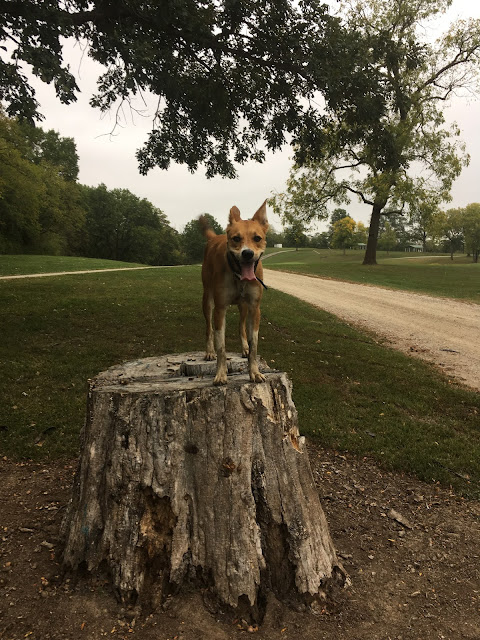Stop + gerund / Stop + infinitive - Podcast Episode 30
Welcome to Episode 30 of The English Sessions. STOP + Gerund/Infinitive. I am your host and English teacher, Mike Butler. These podcasts can help you improve your English! Together, we will talk about grammar… pronunciation… structure... and have some fun too. Remember to visit my website, www.englishsessionswithmike.com to contact me for private lessons, and for more content.
You can also read the transcript of this audio on the website, as you listen to this episode.
Listen for these words today:
To chirp - ‘chirp’ is the sound a bird makes. It’s a noun and a verb. The birds were chirping in the trees.
Solar eclipse - a solar eclipse is when the moon passes between the earth and the sun and everything becomes dark in the middle of the day. You can’t see the sun because of where the moon is in the sky, blocking it.
Let’s start with a little test. Is there a difference in meaning between these two sentences?
1. I stopped learning English
2. I stopped to learn English
Are you not sure? Here’s another example. Once, I was talking about solar eclipses with a friend, who is also an English learner and a student of mine. I told him that I saw a solar eclipse in the United States in 2016. He told me about about a solar eclipse he saw once, in Europe. He said that the sky went dark, and the birds stopped to chirp. “Wait a minute”, I said. “I saw a solar eclipse once, and everything became very quiet. My friend, I think you mean to say “THE BIRDS STOPPED CHIRPING”.
The birds stopped to chirp has the opposite meaning compared to ‘the birds stopped chirping’ here! One is very noisy, and the other is very quiet.
So yes, there is a big difference between #1. I stopped learning English and #2. I stopped to learn English.
Why? I will tell you. First, I want to explain something. I didn’t want to do this episode until I did an episode on transitive/intransitive verbs ( https://www.englishsessionswithmike.com/2020/09/transitiveintransitive-verbs-podcast.html ) an episode on the infinitive ( https://www.englishsessionswithmike.com/2020/08/the-infinitive-basics-podcast-episode-24.html ) and an episode on the gerund too ( https://www.englishsessionswithmike.com/2020/05/gerund-basics-podcast-episode-11.html ). So, if you don’t understand why #1 and #2 have very different meanings, go back and listen to Episode 11, Episode 24, and Episode 28. If you listen to those three episodes, I think you may be able to understand the differences yourself between #1 (stop + gerund) and #2 (stop + infinitive).
Are you still not sure? Okay, I will explain. #1. I stopped learning English. This is a very basic sentence. Subject + verb + object. It has a subject, “I”; a verb (stopped); and an object (learning English). That’s right, ‘Learning English’ is the object in the sentence. How? Remember, this is a gerund phrase, and gerund phrases can be the subject or an object in a sentence. Remember, the gerund is not all ING endings, it is the ING endings that are being used as a noun. It functions like a noun, and a gerund phrase, like ‘learning English’ functions like a noun as well.
So, “I stopped learning English” = I stopped this one thing; this one action. I do not learn English now. Maybe now I am learning French instead, but not English. No more learning English.
Remember, in #1, ‘stop’ is a transitive verb. You have a direct object, just like these sentences: I stopped the train; OR: I stopped my car. You are stopping one thing/ one action.
___________
Okay, ready for #2? #2 was: “I stopped to learn English”. #2 is STOP + infinitive. This has a very different meaning than #1 (STOP + gerund). Remember, often a verb can be transitive sometimes, and intransitive other times. In #2, ‘stop’ is now INTRANSITIVE! There is no direct object. You are not just simply stopping one action.
In fact, #2, “I stopped to learn English”, has two actions in it. Confused? Well, here’s another example:
Once I was walking down the street. I saw a $100 bill on the ground! I got very excited, so I stopped to pick up the $100. It was the best day of my life; I spent it all on pizza and candy.
Okay, do you see what happened there? I stopped walking, because I wanted to pick up the $100 bill. I stopped walking, in order to pick up the $100 bill. See? There are two actions: walking and picking up. I must stop one action, so I can do the other action.
So, #2, “I stopped to learn English” means “I stopped some other activity, and then learned English. For example, “Wow, it was a busy day today! I had so much work to do, but, I knew that I needed to study English, so, I stopped my work early, and then had time to learn English. I spent some time listening to that great English learning podcast, The English Sessions” .
I stopped work, to have time to learn some English, to be able to learn some English. I stopped walking to be able to pick up that $100 bill!
After the break, I will make a little story with both STOP + gerund and STOP + infinitive.
— BREAK—
Okay, let’s use STOP + gerund and STOP + infinitive in a little story.
Murphy, the greatest dog in the world, loves chasing rabbits. He will never stop chasing rabbits. Sometimes he’ll run all the way up the big hill, to the other end of my property, while chasing a rabbit. He never gets the rabbits though. Sometimes he will see a rattlesnake on the property. The rattlesnake will stop to hiss and shake its rattle. Murphy is afraid of the snake. He will stop running around to bark at the snake. That’s how he alerts me to the snakes. He’s a smart dog, a good boy, and that’s probably why he’s still alive.
Remember, STOP + GERUND and STOP + INFINITIVE = DIFFERENT MEANINGS.
Any questions? Write to me at mike@englishsessionswithmike.com . Leave a message for me on the website, www.englishsessionswithmike.com and I will play it on the podcast. Make sure to subscribe to this podcast so you won’t miss an episode. Visit www.englishsessionswithmike.com for more content. Please rate and review The English Sessions on Apple Podcasts, Spotify, or wherever you get your podcasts. Find us on social media. Twitter @theEsessions; Instagram @englishsessionswithmike; Search for The English Sessions on Facebook. Until next time, this is Mike signing off.




Comments
Post a Comment
Please be nice! Do you have any questions? Anything you want me to discuss on the podcast? Leave a message!